أنت هنا
KSU Professor Discusses Multi-Stakeholder Cybersecurity Solutions for a Post COVID-19 Digital World at T20 Summit Season
The final event of the T20 Summit Season under the G20 presidency took place on 27 October 2020 with the webinar of Task Force 11 that was themed with “(COVID-19) Multidisciplinary Approaches to Complex Problems”. The Saudi T20 Secretariat and the Observer Research Foundation (ORF) jointly organized this webinar, which was well attended and represented by global policy experts, diplomats, academics, professionals, and scientists. The main goal of this event was to discuss the current pandemic crisis with the overarching themes of health, socio-economic considerations, markets & financial institutions, multilateralism, and climate & environment. The webinar also reviewed several overarching goals and global pressing challenges with the best thought policy solutions to reduce suffering and expedite a transition to reconstruction after COVID-19.
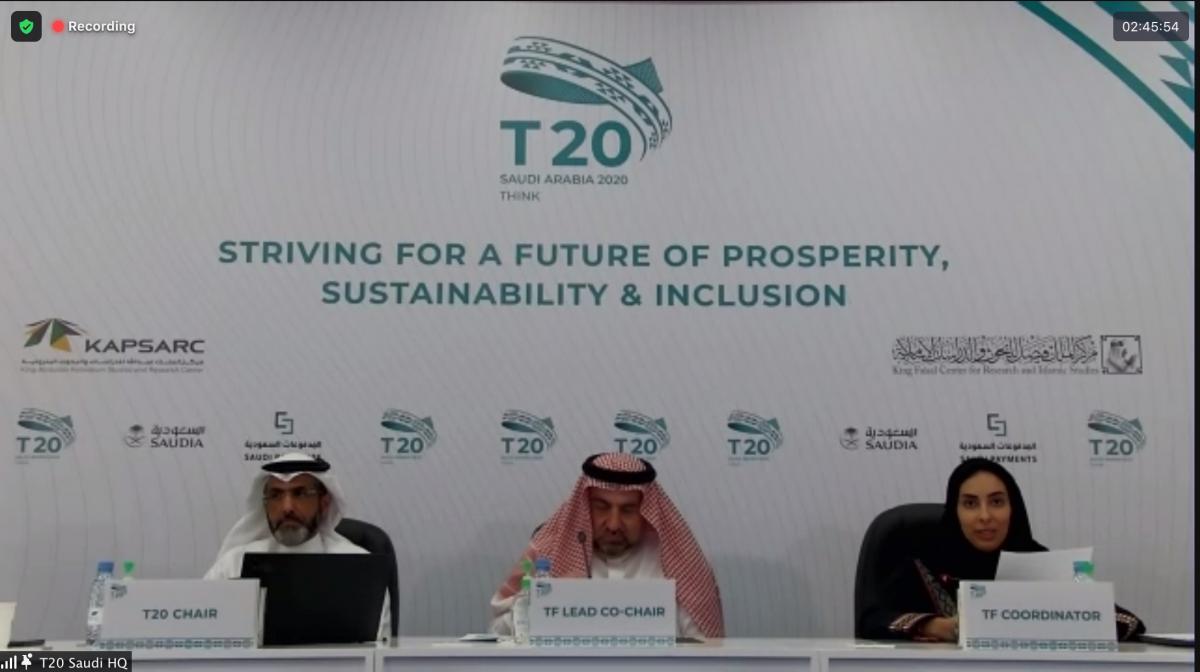
The webinar opened with the welcome remarks of the task force lead co-chair Dr. Yaseen Arabi, the Chairman of Intensive Care Department and Medical Director of Respiratory Services at King Abdulaziz Medical City, Saudi Arabia. Dr. Arabi highlighted the progress of the task force and acknowledged the extraordinary contributions of the authors of 18 policy briefs who proposed a set of evidence-based policy solutions to the T20 in the areas of healthcare, financial reforms, multilateralism, cybersecurity, global governance for social and environmental resilience, and continuity of education during the COVID-19 pandemic.
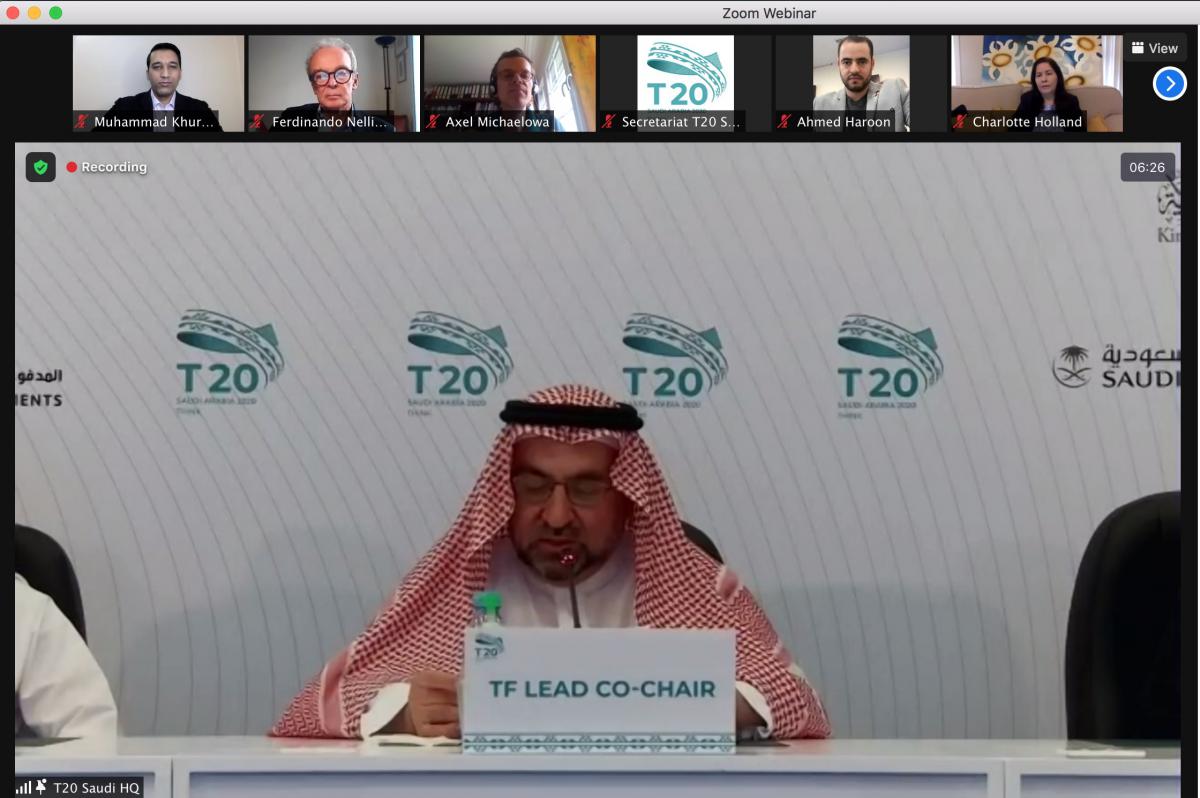
The task force coordinator Ms. Aljawhara Alquayid, a senior research analyst at KAPSARC (Saudi Arabia) introduced the next session, which was graced by Mr. Suresh Prabhu, Sherpa of the G20 for the year 2022, and moderated by Mr. Samir Saran, the president of Observer Research Foundation. In this conversation, Mr. Prabhu discussed the importance of multi-stakeholder approaches, which have paramount importance in addressing the grave issues and challenges of the recent times. He also shared his insights for the G20 to tackle problems faced by the global community, including the vulnerable populations.
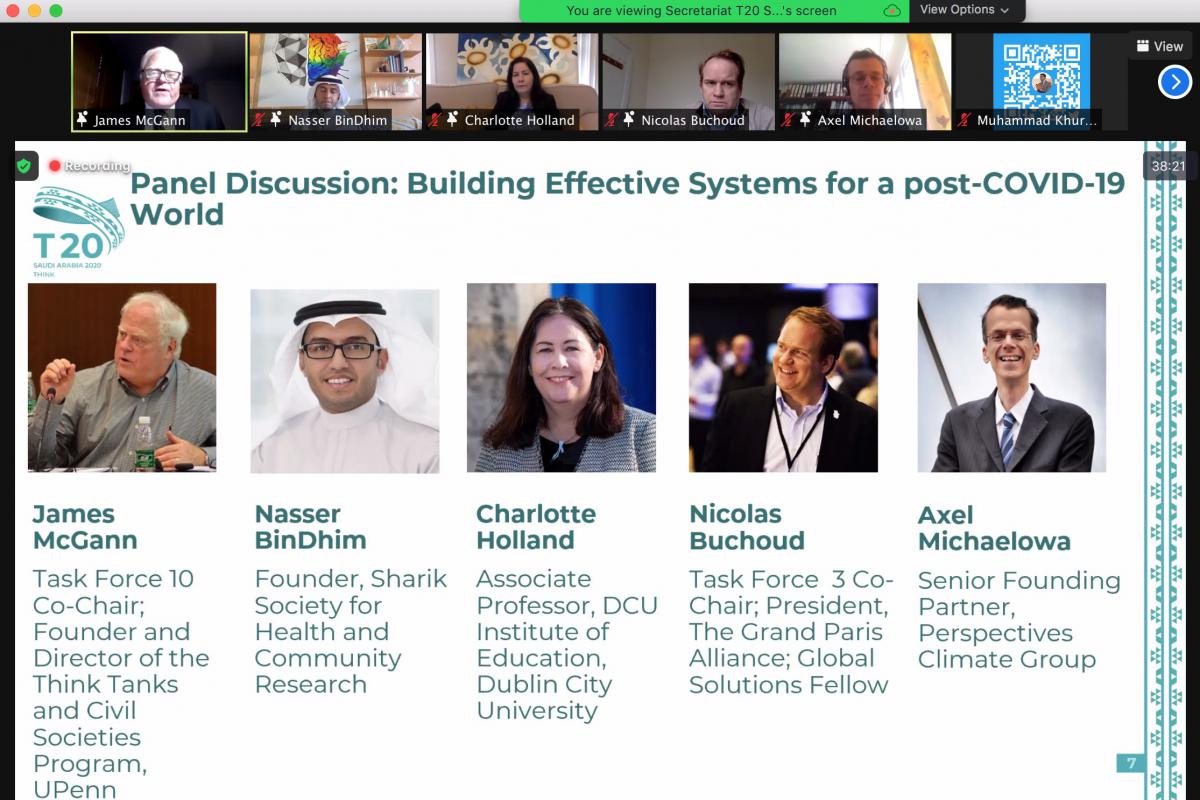
The webinar was then followed by a panel discussion session on ‘Building Effective Systems for a Post-COVID-19 World’ that was moderated by Dr. James McGann, the task force 10 co-chair and director of the think tanks and civil societies program at University of Pennsylvania USA. The panel consisted of leading experts, including Dr. Nasser BinDhim (Sharik Society for Health and Community Research), Dr. Charlotte Holland (Dublin City University Ireland), Mr. Nicolas J.A. Buchoud (Task Force 3 Co-Chair and President of Grand Paris Alliance), and Mr. Axel Michaelowa (Senior Founding Partner at Perspectives Climate Group). The panelists discussed ideas and solutions to build effective systems, processes, and policies for a prosperous world that has disrupted socioeconomically by the current pandemic.
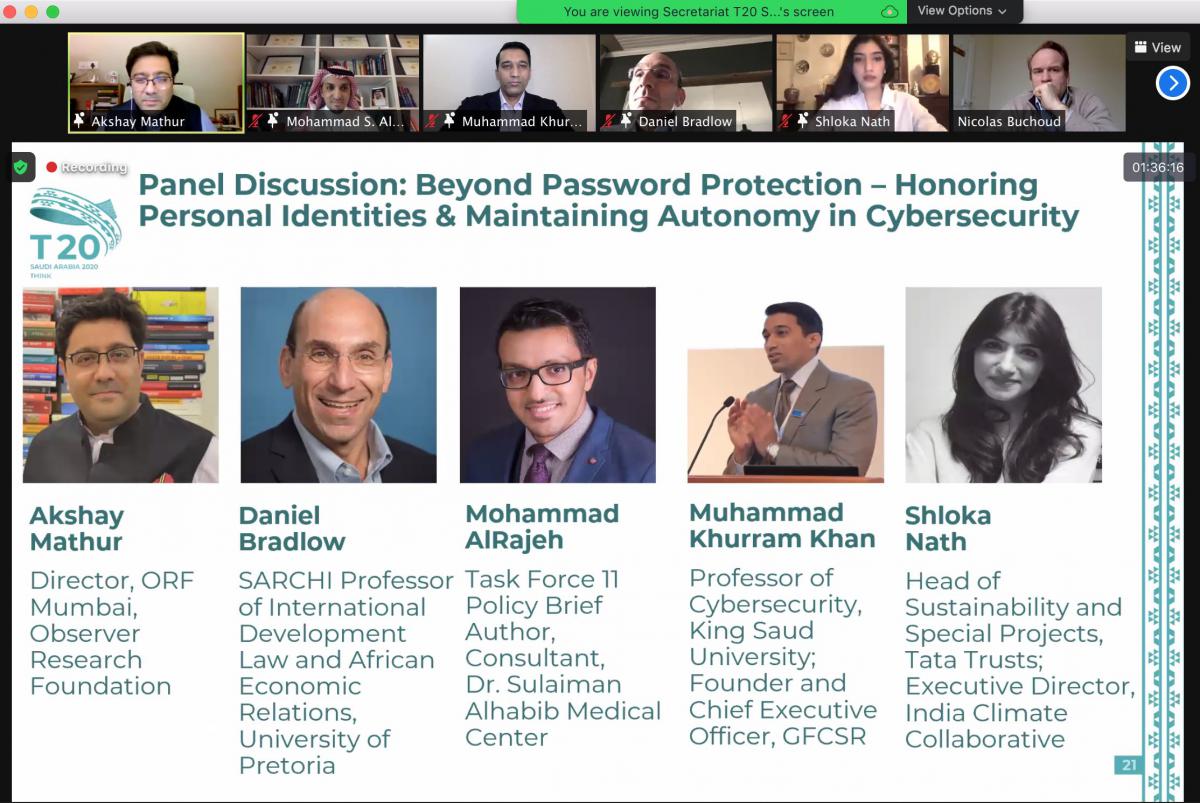
The second panel discussion session of the event was titled as ‘Multi-Stakeholder Approaches for a Post COVID-19 World”, moderated by Mr. Akshay Mathur from Observer Research Foundation. The panel was composed of leading experts and thinkers, including Prof. Daniel Bradlow (SARCHI Professor of International Development Law and African Economic Relations, University of Pretoria), Prof. Muhammad Khurram Khan (Professor of Cybersecurity at Center of Excellence in Information Assurance, King Saud University and Founder and CEO of the Global Foundation for Cyber Studies and Research), Dr. Mohammad AlRajeh (Consultant at Dr. Sulaiman Alhabib Medical Center), and Ms. Shloka Nath (Head of Sustainability and Special Projects, Tata Trusts). The panelists discussed different approaches and policy recommendations from a variety of perspectives, including economics, healthcare, climate, sustainability, and cybersecurity.
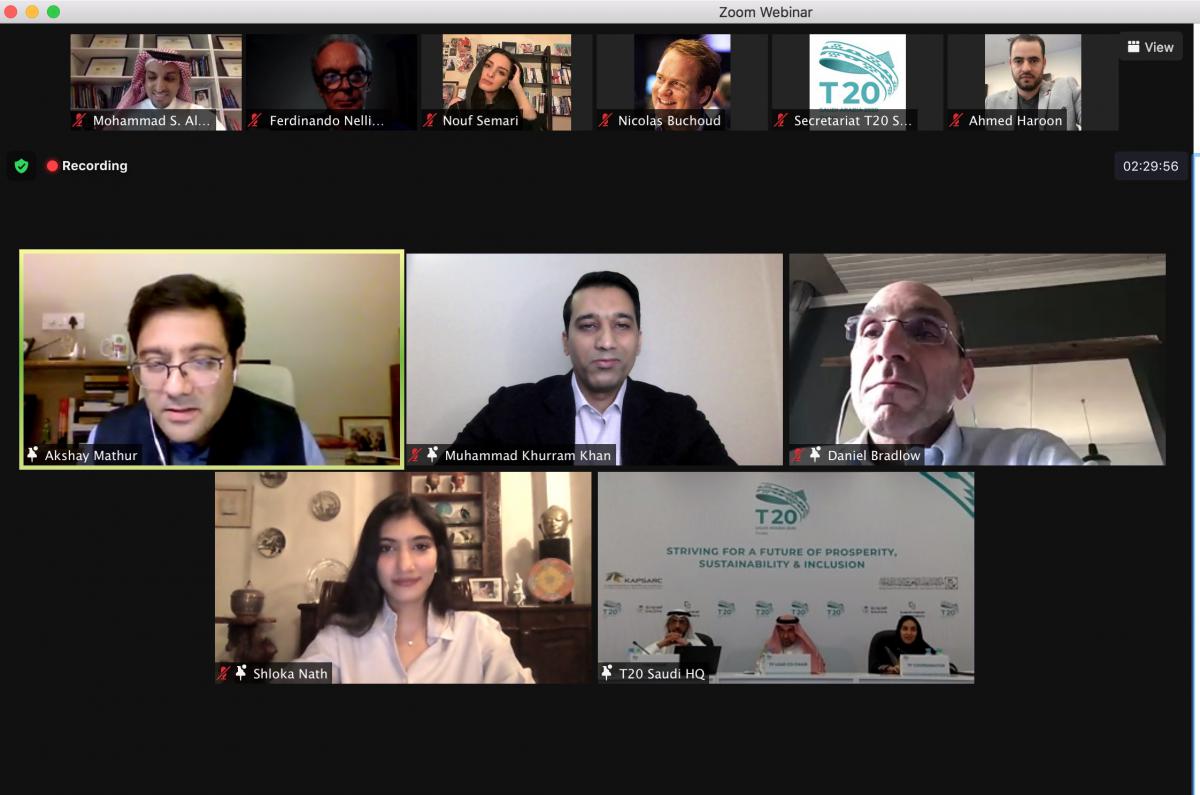
King Saud University (KSU) represented by Prof. Muhammad Khurram Khan from the Center of Excellence in Information Assurance shard his insights from the cybersecurity perspectives in this overwhelming webinar. Prof. Khan has also taken part as a speaker in several webinars of the T20 and contributed his policy solutions for secure cyberspace. It is worth mentioning that Prof. Khan published a policy brief entitled, “Heightening Cybersecurity to Promote Safety and Fairness for Citizens in the Post COVID-19 Digital World”, which underscores the need of protecting citizens and online users from cybersecurity threats. This work presents a set of recommendations to the G20 leaders and other stakeholders, including the global tech organizations and policy makers and proposes the following policy solutions, including:
- To establish a multilateral framework for cybersecurity protocols by building a set of international regulations to be incorporated into national regulatory systems. This framework would require tech service providers and businesses to implement right systemic controls to prevent attacks and take appropriate remedial actions whenever cyber breaches occur.
- To encourage the private sector, including technology platforms, to assist in the efforts of raising consumers’ cyber literacy and awareness by embedding educational information into their systems and applications, particularly for the ‘digitally vulnerable’ segment of our society.
- To develop a cyber index to measure collective progress and efforts aimed at protecting consumers, their data and assets, as well as preserving their privacy from cyberattacks.
- To broaden the community and skills capacity of cybersecurity professionals with more diversity and inclusion and make efforts in increasing the employment of women in the cyber industry.
Afterwards, an Italian perspective was presented by Mr. Ferdinando Nelli Feroci, the President, Istituto Affari Internazionali (IAI), Italy. In his speech, Mr. Ferdinando enlightened the audience with his experiences and insights on the solutions of current challenges with future prospects. Furthermore, he discussed some multilateral approaches, which could play a pivotal role in solving the problems of recent times.
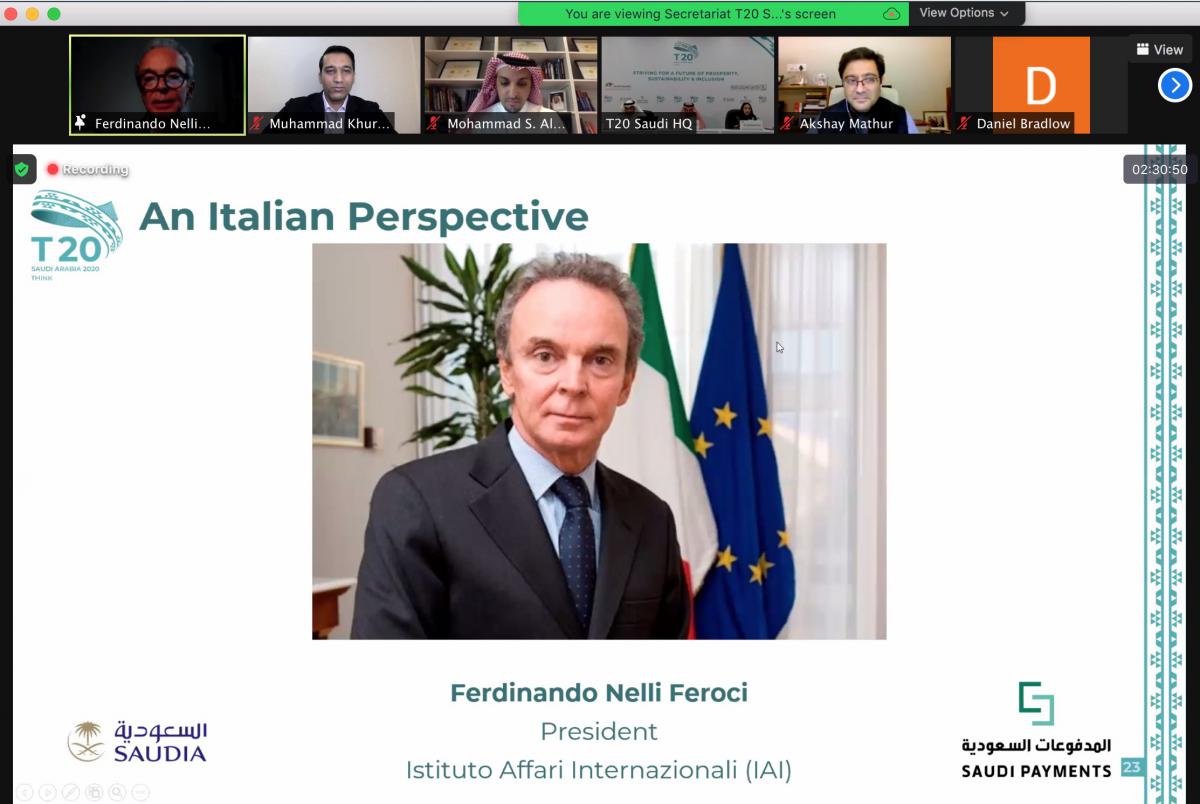
The webinar also included an art presentation by Ms. Nouf Semari, who inspired the audience by her outstanding artwork that incorporates and reflects the task force theme. She also shared a brief story about her dedication and inspiration to the work being done for a long time.
At the end, Dr. Fahad M. Alturki, the chair of T20 Saudi Arabia and Vice President of King Abdullah Petroleum Studies and Research Center shared his concluding remarks by thanking the task force co-chairs, authors, speakers and participants for their wonderful contributions in drafting the impactful policy solutions for the G20. Dr. Fahad also underscored the significance of multilateralism, partnership, and collaboration in addressing the challenges faced by the global community. Moreover, he highlighted the importance of building resilient systems and supply chains, collaboration and information sharing, and making socio-economic impact on global community, especially the vulnerable groups.
It is to note that the T20 is one of the engagement groups of the G20, which is considered as the idea bank and consists of think tanks, leading scholars and subject matter experts from the world. Throughout the year, T20 continues discussions under its task forces (TF) and comes up with the research-based policy recommendations presented to the G20 leaders through a communique.